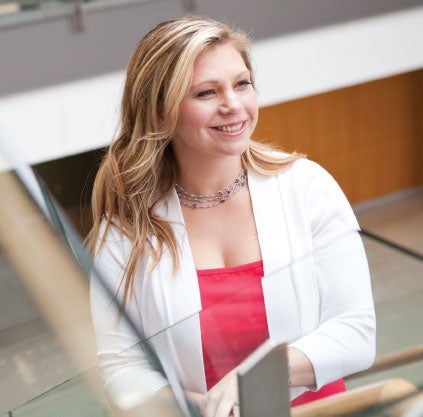 Eight-year-old Laura Funk Zucker ’06 (M.A.T.) turned around to see her parents, but the door to the hallway where they’d just kissed her goodbye was closed. She looked around in a panic. Who are these people? Why aren’t they talking to me? Where is my doctor? Why is this stranger holding a mask to my face?
Eight-year-old Laura Funk Zucker ’06 (M.A.T.) turned around to see her parents, but the door to the hallway where they’d just kissed her goodbye was closed. She looked around in a panic. Who are these people? Why aren’t they talking to me? Where is my doctor? Why is this stranger holding a mask to my face?
Tearing the mask away, she burst into tears. No one comforted her.
“I just remember it being a very terrifying and lonely situation. I was so scared,” recalls Zucker, who – born with a cleft lip and palate – underwent many surgeries as a child (her 20th surgery was just last summer). “That fear and that feeling of being all alone really stuck with me, and, growing up, I wanted to make sure other children didn’t have to go through that. I wanted them to be aware of what was coming up next, prepare them for the next step so they wouldn’t have to feel that fear I felt.”
That’s what led Zucker to major in childhood psychology as an undergraduate at the University of Georgia and, subsequently, to look into becoming a child life specialist.
Providing emotional support, therapeutic intervention and practical education in a variety of health care settings, child life specialists are advocates and resources for children and their families going through stressful medical situations. Had a child life specialist been on site for the surgery Zucker had at age 8, she would have been walked through the process, prepared for what was going to be happening and introduced to the nurses and technicians. She would have been comforted.
It was what Zucker had always wanted to do. Unfortunately, the College didn’t have a child life program when Zucker and her husband moved to Charleston in 2005. The closest line of study would be the M.A.T. in early childhood education – and so she worked with faculty to move electives around and make her coursework resemble child life coursework as closely as possible. Then, upon earning her M.A.T. in early childhood education, Zucker planned to intern with the Medical University of South Carolina’s child life program. That plan, however, was thwarted by the birth of her children and then again by the death of her father.
“I thought maybe it wasn’t working out for a reason, so I decided to rethink it,” says Zucker. “I decided instead to be an advocate for child life and help other people be child life specialists.”
She decided to start the first – and only – child life master’s degree program in the state.
“It’s a growing field, and the Child Life Council says that, by 2020, all child life specialists will be required to have master’s degrees. It just seemed like the perfect thing to do,” says Zucker, who pitched the idea to cohorts from the College and MUSC. “I explained to everyone that we had a huge opportunity to get ahead of the game here.”
Everyone agreed.
“Nobody was questioning how much this was needed,” says Zucker. “It was passed easily and quickly, which proves that everyone understands how important it is and that this was the right direction to go.”
The College’s Master of Science in Child Life Program was thus established in 2014, offering coursework at the College and practicum experience at MUSC. Trained to support infants, children and adolescents, graduates are prepared to pass the Child Life Council’s Professional Certification Examination and go on to practice in hospitals, clinics and other medical settings.
“I’m so proud of the College for taking this opportunity. And I love being in the background while the program takes on a life of its own,” says Zucker, who serves on the program’s board and regularly visits students to tell them her story. “I give them the personal aspect, which affirms for them that what they’re doing will make a difference in a child’s life.”
And that, to Zucker, is a comfort in and of itself.




